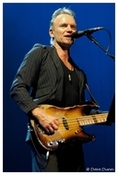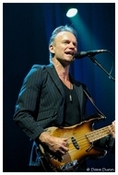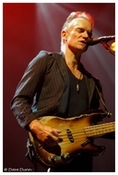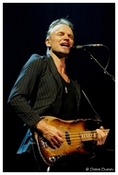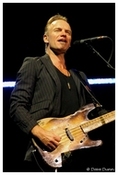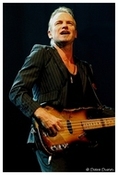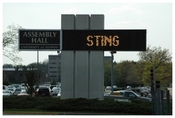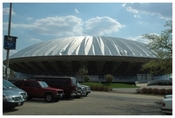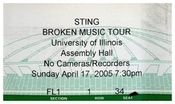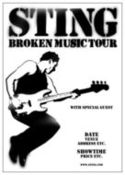
Broken Music
Apr
17
2005
Champaign, IL, US
University Assembly Hallwith Phantom Planet
Sting stirs crowd with a mix of hits...
In the midst of the blackness and the silence covering the stage, a mischievous voice rang out, ''Why are you so quiet out there?''
From the moment Sting - the face behind the voice - stepped out on stage Sunday night at the University of Illinois Assembly Hall, it was never quiet again.
Sting's 'Broken Music Tour' featured Sting on bass, Dominic Miller on guitar, Shane Fontayne on guitar and Josh Freese on drums. Only Miller has played extensively with Sting prior to this tour.
The current tour is all about playing songs that Sting hasn't played live in a long while, and that meant a heavy selection of songs by The Police, the new wave/pop-punk band that brought Sting fame and fortune.
And The Police emphasis was clear from the first couple songs, the crowd-pleasing, 'Message in a Bottle' and 'Spirits in the Material World'.
The four-piece band was superb, with Sting leading the way on his beat-up Fender bass, which he has owned since his days with The Police. But the Police songs were not note-for-note knockoffs, and the band had plenty of room to breathe its own life into the songs. Miller, who is playing a Gibson Les Paul for the first time for an extended period, looked right at home on the instrument, and Freese was also very strong in leading the rhythm section. I especially enjoyed his pounding out the ska-rock numbers of early Police hits. Fontayne, too, played some nice guitar licks, as well as harmonica.
Sting looked dapper in his shiny black shoes, black pants and black jacket worn over a black T-shirt. He looks in great shape for 53, and his voice is still able to hit all those high, keening notes he's known for, although it doesn't look easy, and I spotted a small bottle of throat spray atop a monitor speaker in front on him.
And even though there were plenty of Police songs performed - 'Demolition Man', 'Synchronicity II', 'Driven to Tears', 'Invisible Sun' and 'Roxanne' (a crowd favorite) among them - this was not a reunion concert. Sting also played plenty of material from his solo albums, many of which are just as strong, if not better, than his work in The Police.
Among my favorites were 'Prologue (If I Ever Lose My Faith in You)', 'I Hung My Head', the sad 'End of the Game', the lovely 'Fields of Gold' and 'Desert Rose' from the 'Brand New Day' CD.
Another highlight was not Sting-penned, but a McCartney and Lennon original. Sting (born Gordon Sumner) acknowledged a heavy musical debt to his favorite band, The Beatles, when he launched into 'A Day in the Life', certainly one of the most unusual Beatles songs to decide to cover.
Another sign that this was not a Police reunion tour was the absence of several of the band's biggest hits, 'Every Breath You Take', 'De Do Do Do, De Da Da Da', 'Don't Stand' and 'Every Little Thing She Does is Magic'. Still, the crowd didn't seem disappointed (obvious from the two encores and many standing ovations), and Sting's solo hits more than made up for their being left off the playlist.
It's been 23 years since Sting last played in Champaign-Urbana (as a member of The Police, with UB40 opening), and he promised the next gap won't be so long. We can only hope.
(c) The News-Gazette by Kirby Pringle
Sting rolls into Assembly Hall...
It's been nearly 20 years since Copeland and Summers had enough of creepy schoolteacher-turned pop star Sting, and it's difficult to say whether Sting, in his most modern persona, is a shell of his former self or whether his original persona was unduly credited with success.
That aside, it only seems appropriate that after a tour that featured, among other musicians, a cellist and popular jazz bassist Christian McBride (who, rumor has it, repeatedly disrespected Sting's music abilities), and bald-headed singer (and Eurythemics vocalist) Annie Lennox as an opener, the following tour, entitled ''Broken Music,'' would be more minimalist. Declaring that the ''last time I played in this building was 1982,'' near the peak of the Police's domination of radio, Sting, with two guitarists and a drummer in tow, played Assembly Hall April 17.
Those who haven't been to the arena recently will be impressed with the care given turning Bruce Weber's home into a concert venue-the usually confusing acoustics of the gigantic hall were satisfyingly listenable, and extensive robotic lighting, heavy gray curtains and sensible interior decoration suited the aesthetics of a room filled with mostly older women (in groups) or couples. That said, the crowd was healthily familiar with the material, holding up cell phones, the lighter for the Nutrisweet generation, during ballad 'Fields of Gold', for which candles perhaps would have been more appropriate.
Kicking off quickly after opener Phantom Planet's set with the ever-popular classic rock radio track 'Message In A Bottle', the band quickly dived into world-music Police b-sides, seguing 'Voices Inside My Head' into 'When The World Is Running Down', and the distopian 'Spirits In A Material World', but never lost sight of his current adult-like footing. Sting avoided the touchy subject of politics during banter, only mentioning fox hunting (a non-issue for Americans) as a introduction to a song on the subject, but the songs say what couldn't easily be said without risk to such a game (and largely older) audience, playing 'Driven To Tears' off 'Zenyatta Mondatta', which Pearl Jam more-topically covered on the same stage during a tour stop two years prior. Another strange match between band and audience is the excellent 'Bed's Too Big Without You': despite a stellar performance, the angst didn't connect with the audience.
Ignoring what's been said to the contrary, Sting still plays excellent bass (but never needs to pay attention to the instrument) and his manners and couture were a fitting complement to his excellent performance.
Drummer Josh Freese (A Perfect Circle) found himself in the difficult situation of being called upon to recreate Steward Copeland playing, undoubtedly one of the best drummers to ever cut vinyl. In addition to exhibiting an excellent sense of Copeland's sound and energy, in stage lights he seemingly resembled the man.
The two guitarists performed well in reworking the keyboard-rich solo material, but some of original Police guitarist Andy Summer's more sublime atmospherics, an important ingredient in many of the originals, went by the wayside. That said, the hired hands were up to the material.
Guitarist Shane Fontayne surprisingly, and inappropriately, debuted a harmonica cage during a few songs. Both were given a few chances to take the lead, and while they performed serviceably in this role, the beauty of many of the original songs is the lack of solos: just as the Ramones were taking a stand against running up and down a fretboard, without soul, the Police were silently recording tracks in the same nature, focusing on richness of sound. Though the crowd clearly enjoyed solo material like an energetically-performed 'If I Ever Lose My Faith In You', during which it was possible to close your eyes and imagine it more vital than ever, the clear highlight was the vim given to the performance of 'Synchroncity II', the first track on the side B of the final Police album. The progressive sounds of the track, which protests the noise in modern society, combined with excellent work from the band, was all one could hope for.
After a 'Roxanne' heavily aided by futuristic lighting and a double-encore, featuring as a highlight early punk-ish Police track 'Next To You', the house lights rose and the hall was filled with piped-in music: Coldplay's 2002 hit 'Clocks', a jazzy, world-musicy slice of Brit-pop and a track strongly influenced by Sting's musical ambitions, existential crises and universal concerns, an unambiguous statement of Gordon Sumner's imprint on musical culture.
(c) The Weekly Buzz
In the midst of the blackness and the silence covering the stage, a mischievous voice rang out, ''Why are you so quiet out there?''
From the moment Sting - the face behind the voice - stepped out on stage Sunday night at the University of Illinois Assembly Hall, it was never quiet again.
Sting's 'Broken Music Tour' featured Sting on bass, Dominic Miller on guitar, Shane Fontayne on guitar and Josh Freese on drums. Only Miller has played extensively with Sting prior to this tour.
The current tour is all about playing songs that Sting hasn't played live in a long while, and that meant a heavy selection of songs by The Police, the new wave/pop-punk band that brought Sting fame and fortune.
And The Police emphasis was clear from the first couple songs, the crowd-pleasing, 'Message in a Bottle' and 'Spirits in the Material World'.
The four-piece band was superb, with Sting leading the way on his beat-up Fender bass, which he has owned since his days with The Police. But the Police songs were not note-for-note knockoffs, and the band had plenty of room to breathe its own life into the songs. Miller, who is playing a Gibson Les Paul for the first time for an extended period, looked right at home on the instrument, and Freese was also very strong in leading the rhythm section. I especially enjoyed his pounding out the ska-rock numbers of early Police hits. Fontayne, too, played some nice guitar licks, as well as harmonica.
Sting looked dapper in his shiny black shoes, black pants and black jacket worn over a black T-shirt. He looks in great shape for 53, and his voice is still able to hit all those high, keening notes he's known for, although it doesn't look easy, and I spotted a small bottle of throat spray atop a monitor speaker in front on him.
And even though there were plenty of Police songs performed - 'Demolition Man', 'Synchronicity II', 'Driven to Tears', 'Invisible Sun' and 'Roxanne' (a crowd favorite) among them - this was not a reunion concert. Sting also played plenty of material from his solo albums, many of which are just as strong, if not better, than his work in The Police.
Among my favorites were 'Prologue (If I Ever Lose My Faith in You)', 'I Hung My Head', the sad 'End of the Game', the lovely 'Fields of Gold' and 'Desert Rose' from the 'Brand New Day' CD.
Another highlight was not Sting-penned, but a McCartney and Lennon original. Sting (born Gordon Sumner) acknowledged a heavy musical debt to his favorite band, The Beatles, when he launched into 'A Day in the Life', certainly one of the most unusual Beatles songs to decide to cover.
Another sign that this was not a Police reunion tour was the absence of several of the band's biggest hits, 'Every Breath You Take', 'De Do Do Do, De Da Da Da', 'Don't Stand' and 'Every Little Thing She Does is Magic'. Still, the crowd didn't seem disappointed (obvious from the two encores and many standing ovations), and Sting's solo hits more than made up for their being left off the playlist.
It's been 23 years since Sting last played in Champaign-Urbana (as a member of The Police, with UB40 opening), and he promised the next gap won't be so long. We can only hope.
(c) The News-Gazette by Kirby Pringle
Sting rolls into Assembly Hall...
It's been nearly 20 years since Copeland and Summers had enough of creepy schoolteacher-turned pop star Sting, and it's difficult to say whether Sting, in his most modern persona, is a shell of his former self or whether his original persona was unduly credited with success.
That aside, it only seems appropriate that after a tour that featured, among other musicians, a cellist and popular jazz bassist Christian McBride (who, rumor has it, repeatedly disrespected Sting's music abilities), and bald-headed singer (and Eurythemics vocalist) Annie Lennox as an opener, the following tour, entitled ''Broken Music,'' would be more minimalist. Declaring that the ''last time I played in this building was 1982,'' near the peak of the Police's domination of radio, Sting, with two guitarists and a drummer in tow, played Assembly Hall April 17.
Those who haven't been to the arena recently will be impressed with the care given turning Bruce Weber's home into a concert venue-the usually confusing acoustics of the gigantic hall were satisfyingly listenable, and extensive robotic lighting, heavy gray curtains and sensible interior decoration suited the aesthetics of a room filled with mostly older women (in groups) or couples. That said, the crowd was healthily familiar with the material, holding up cell phones, the lighter for the Nutrisweet generation, during ballad 'Fields of Gold', for which candles perhaps would have been more appropriate.
Kicking off quickly after opener Phantom Planet's set with the ever-popular classic rock radio track 'Message In A Bottle', the band quickly dived into world-music Police b-sides, seguing 'Voices Inside My Head' into 'When The World Is Running Down', and the distopian 'Spirits In A Material World', but never lost sight of his current adult-like footing. Sting avoided the touchy subject of politics during banter, only mentioning fox hunting (a non-issue for Americans) as a introduction to a song on the subject, but the songs say what couldn't easily be said without risk to such a game (and largely older) audience, playing 'Driven To Tears' off 'Zenyatta Mondatta', which Pearl Jam more-topically covered on the same stage during a tour stop two years prior. Another strange match between band and audience is the excellent 'Bed's Too Big Without You': despite a stellar performance, the angst didn't connect with the audience.
Ignoring what's been said to the contrary, Sting still plays excellent bass (but never needs to pay attention to the instrument) and his manners and couture were a fitting complement to his excellent performance.
Drummer Josh Freese (A Perfect Circle) found himself in the difficult situation of being called upon to recreate Steward Copeland playing, undoubtedly one of the best drummers to ever cut vinyl. In addition to exhibiting an excellent sense of Copeland's sound and energy, in stage lights he seemingly resembled the man.
The two guitarists performed well in reworking the keyboard-rich solo material, but some of original Police guitarist Andy Summer's more sublime atmospherics, an important ingredient in many of the originals, went by the wayside. That said, the hired hands were up to the material.
Guitarist Shane Fontayne surprisingly, and inappropriately, debuted a harmonica cage during a few songs. Both were given a few chances to take the lead, and while they performed serviceably in this role, the beauty of many of the original songs is the lack of solos: just as the Ramones were taking a stand against running up and down a fretboard, without soul, the Police were silently recording tracks in the same nature, focusing on richness of sound. Though the crowd clearly enjoyed solo material like an energetically-performed 'If I Ever Lose My Faith In You', during which it was possible to close your eyes and imagine it more vital than ever, the clear highlight was the vim given to the performance of 'Synchroncity II', the first track on the side B of the final Police album. The progressive sounds of the track, which protests the noise in modern society, combined with excellent work from the band, was all one could hope for.
After a 'Roxanne' heavily aided by futuristic lighting and a double-encore, featuring as a highlight early punk-ish Police track 'Next To You', the house lights rose and the hall was filled with piped-in music: Coldplay's 2002 hit 'Clocks', a jazzy, world-musicy slice of Brit-pop and a track strongly influenced by Sting's musical ambitions, existential crises and universal concerns, an unambiguous statement of Gordon Sumner's imprint on musical culture.
(c) The Weekly Buzz

